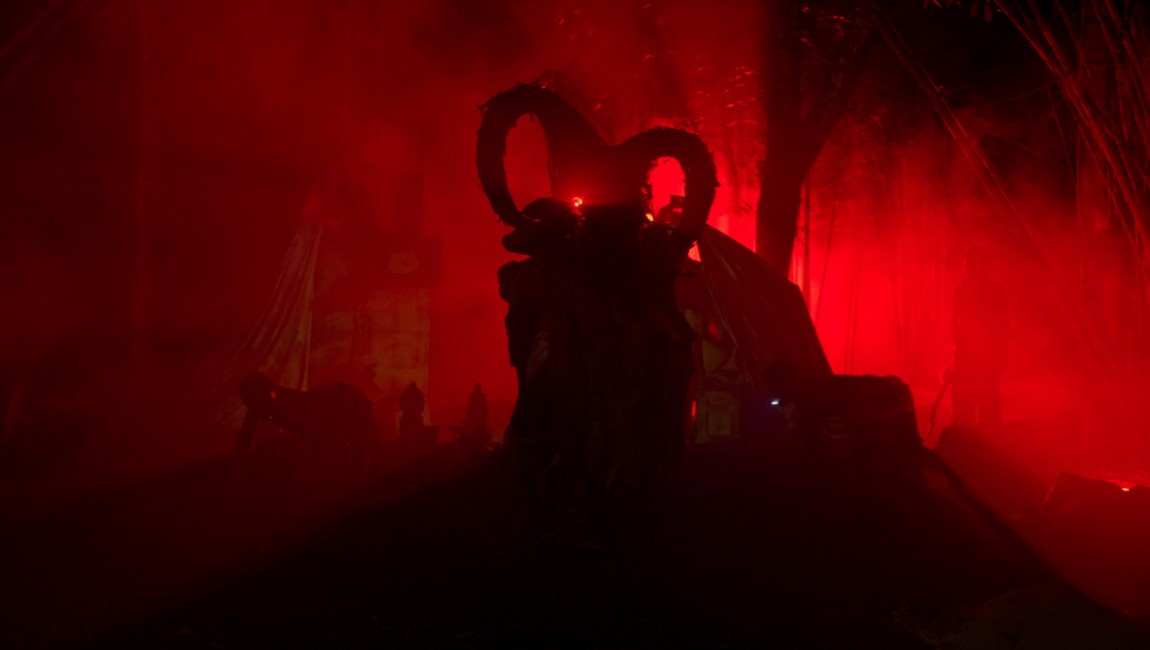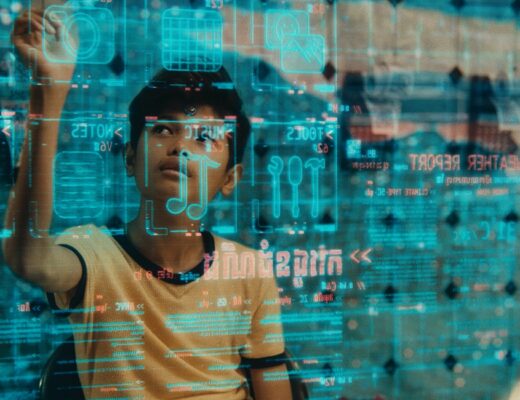For the Dutch philosopher Baruch Spinoza, the world comprised a single substance, and that substance was God. “Except God,” he wrote in the treatise Ethics, “no substance can be or be conceived.” Spinoza’s monistic philosophy — directly opposed to the Cartesian view that mind and body were ontologically distinct — was heretical in its day and mostly forgotten now, as the onset of Western rationalism and its imperial enterprise paved the way for a world neatly segmented into its material and spiritual constituents. Where God exists, He does so beyond the purview of the scientific method; where science thrives, similarly, folklore and intuition have little place.
Monisme, Riar Rizaldi’s enthralling, if haphazard first feature, is no less an attempt to overturn these dualist precepts. Rizaldi, however, returns not to the Spinozist God, but reclaims Him in the towering spectacle of Mount Merapi, Indonesia’s most active volcano. Bordering Central Java and Yogyakarta, two of the archipelago’s many provinces, Merapi is home to a bustling ecosystem of rural and natural life, its fertile base hosting miles of lush tropical forests and vegetation. Yet Merapi — Javanese for “fire mountain” — also portends death and destruction. It erupts every several years, and its pyroclastic flows last killed 353 people and relocated over 350,000 in 2010. More ominously, the imbalance in the volcano’s immediate environment is an artificial one, wrought by years of systematic and illegal sand mining that have eroded the foundations of its dams, built to halt the progress of volcanic ash and prevent the contamination of nearby rivers.
A fascinating corollary to Spinoza’s thought quickly emerges, pitting man and nature, two hitherto opposed elements, together as one. At the heart of Monisme is a profoundly anti-colonialist attitude toward Merapi’s exploitation, both on the ground by hordes of paramilitaries and in its scientific and cultural imaginations alike. The film adopts a hybrid, shape-shifting form as it traverses the volcano’s various locales and encounters their denizens: from the volcanologists, who steadfastly monitor its plumes via CCTV monitors, to the state-sanctioned thugs who thwart their nocturnal expeditions to examine its soil, and rather playfully, to a documentary crew intent on capturing the lives and sentiments of the local miners. Never quite adhering to a straightforward narrative, yet neither is it wholly observational, the film blends ethnography with speculative fiction, quasi-documentarian extracts with more fantastical sequences of a mythological parallel world.
Much like Rizaldi’s 2020 short film, Tellurian Drama, which took significant creative liberties with archival history to fashion an intersectional essay on Dutch imperialism and its technological incursions, Monisme champions a kind of poeticism equally reliant on political explication and cultural syncretism. Its ideological backbone is fleshed out with the dramatization of conflict between the corrupt offices of government — their proxy henchmen, specifically — and those fighting to restore Merapi’s ecological balance, while Rizaldi trains his lens on a shamanistic ritual deep within its forests to elicit a feeling of implacable awe. As the volcano’s many twilit landscapes (a misty foreboding hue, a deep purgatorial red) converge on-screen without coalescing, they parallel Monisme’s uneasy juxtaposition of tradition with modernity, a juxtaposition demonstrably challenging because of modernity’s formidable imposition of capital onto tradition’s many strata. In the lawlessness of rural Indonesia, a gun-toting gangster is all it takes to suck the land dry.
At times, nonetheless, these virtues stagger under the weight of the film’s didacticism. Had Monisme been conceived as installation art and rendered considerably shorter, its pointed environmentalism could have accrued greater significance. Rizaldi, however, resorts to pithy but somewhat labored aphorisms, delivered by his scientific messengers as foreshadowing of the film’s supernatural slant in its second half. “All of the infrastructures we have today, buildings and technology, were created from minerals dug up from the earth. Humans are merely larger and slightly more complex worms.” Configuring its latent ideas explicitly has the unfortunate effect of pigeonholing them into bite-sized, pseudo-philosophical activism, as exemplified by Monisme’s aversion to radicalism: instead of encasing its narrative in an alternative cultural logic, seen exclusively through native eyes, the film seeks refuge in omniscience, supplanting its ethnographic images with those cribbed from decidedly non-native aesthetics. Pacifiction and Only God Forgives both come to mind here, although it’s Memoria, perhaps, that offers the strongest basis for comparison. Whereas Apichatpong Weerasethakul’s film ultimately preserves the impenetrability of its mysticism in its sound design, Monisme, somewhat overzealously, spells out in narration all there is to say about Merapi’s bristling embers and, in so doing, weakens the profundity and sovereignty of God.
Published as part of InRO Weekly — Volume 1, Issue 27







